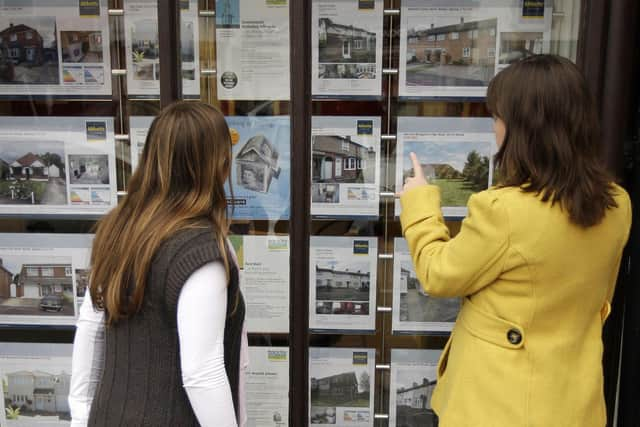Margaret Thatcher's dream of a home-owning nation has died and may take Boris Johnson's Tories with it – Joyce McMillan


When I took an evening stroll through the town, though, I could not help noticing how many houses and flats – perhaps a half, perhaps more – seemed dark and shuttered, clearly unoccupied on a November night. Airbnb rentals seemed plentiful, but hotel rooms were hard to come by, and local people struggle, so it seems, to find anywhere to live at all.
It’s a familiar story from around coastal Britain; and it set me thinking about the current condition of UK politics, and which of the many woes currently besieging Boris Johnson’s government might finally drive the Conservatives out of power.
Advertisement
Hide AdAdvertisement
Hide AdIt is becoming increasingly clear, in this second Covid winter, that we are now living in the relatively shattered aftermath of the great Thatcherite experiment that began in Britain four decades ago.
One by one, the great shibboleths of that revolution have begun to fall, from the idea of rail privatisation, to the private energy supply companies now going down like ninepins, and being caught by government as they go.
The pandemic itself, of course, has taken a wrecking-ball to the myth that the main task of government is simply to get out of the way of markets.
And with the gradual collapse of the Tories’ grand ideological project have come all the other signs and symptoms of a political movement in decay, including the Brexit debacle, the ugly and unseemly grab for cash in pandemic-related contracts, and the mounting suspicion that Tory politicians and their wealthy backers simply do not feel bound by the same rules as the rest of us, on Covid or anything else.


What remains unknown, though, is which of these evident failures might begin to damage the Conservatives to the point where they might lose their grip on power; and if there is one increasingly conspicuous area of failure that affects every family in the UK, one way or another, it is the growing dysfunction of the UK housing market, where the ever-increasing popularity of UK land and property as an investment – both for large commercial interests, and for individuals – has made it far more difficult for the next generation of British citizens to gain a foothold on the property ladder, while coping with soaring private sector rents.
The promise of near-universal home ownership was, after all, one of the most popular aspects of the Thatcher revolution, a generation ago; and at first it seemed hugely successful, as millions of working-class Britons bought up the council houses that had served their families well since the Second World War.
In an age of mounting social inequalities, though, the consequences of that revolution for those on ordinary wages have become steadily more damaging.
According to a 2018 study by the institute of Fiscal Studies, the proportion of 25 to 34-year-olds on middle incomes who owned their own homes plummeted from 65 to 27 per cent between 1995 and 2015, while the ratio of house prices to earnings almost doubled.
Advertisement
Hide AdAdvertisement
Hide AdAt the same time, fertility levels of women in the UK have crashed to new lows; and behind those statistics – according to the Social Market Foundation – lie basic economic issues including “people’s inability to get onto the property ladder, and the rise in low wages and job insecurity”.
We have here, in other words, are the makings of a serious source of popular discontent, not least with a Conservative government that seems to have no intention of seriously tackling the elements of this crisis that involve sensitive issues such as land ownership, and curbs or much higher taxes on second home ownership.
And if this failure represents an increasing problem for the Conservatives, then it should also provide an opportunity for opposition parties with coherent plans to improve the situation.
The Green Party in all parts of the UK is clearly ahead of the curve on this issue, seeing the current crisis as an opportunity to build a new generation of environmentally sustainable, socially owned homes – a new age of the “green prefab”, if you like.
The SNP, by contrast, is notoriously cautious when it comes to confronting Scotland’s unreformed land ownership system; indeed in a recent Wales Today survey of European approaches to the second homes issue, Scotland was not even listed.
The Welsh government is about to start a modest pilot scheme with selected local authorities designed to tackle the problem in coastal areas; and some English local authorities, from Devon to Northumberland, have banned the building of any further new holiday homes for let.
So far, though, it is difficult to foresee any of these measures making much of a dent in a housing market so massively exposed to, and distorted by, the huge amounts of wealth now washing around in the global financial system, and by the growing tendency to hoard housing as an asset; nor is it easy to imagine Keir Starmer’s Labour Party adopting any policies in this area radical enough to be effective.
Secure and affordable housing, though, is one of the absolute fundamentals of human well-being, alongside health and education.
Advertisement
Hide AdAdvertisement
Hide AdAnd if the UK continues to elect governments that will not deal with the growing dysfunction in Britain’s housing system, then this failure could become yet another pressure driving the nation apart.
Not because the Welsh or Scottish governments necessarily show much more radicalism, but because people denied one of the basics of a dignified and fulfilled life will tend to seek change, and to turn to those who, however tenuously, seem to offer hope of better government, based on a clearer understanding of the problems they face, and on values that more closely reflect their own.
A message from the Editor:
Thank you for reading this article. We're more reliant on your support than ever as the shift in consumer habits brought about by coronavirus impacts our advertisers.
If you haven't already, please consider supporting our trusted, fact-checked journalism by taking out a digital subscription.
Comments
Want to join the conversation? Please or to comment on this article.

